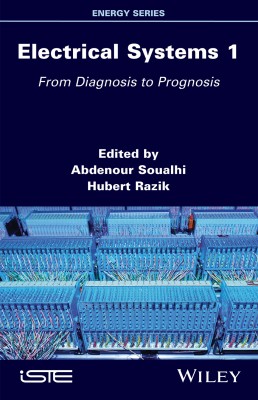
Methods of diagnosis and prognosis play a key role in the reliability and safety of industrial systems.
Failure diagnosis requires the use of suitable sensors, which provide signals that are processed to monitor features (health indicators) for defects. These features are required to distinguish between operating states, in order to inform the operator of the severity level, or even the type, of a failure.
Prognosis is defined as the estimation of a system’s lifespan, including how long remains and how long has passed. It also encompasses the prediction of impending failures. This is a challenge that many researchers are currently trying to address.
Electrical Systems, a book in two volumes, informs readers of the theoretical solutions to this problem, and the results obtained in several laboratories in France, Spain and further afield. To this end, many researchers from the scientific community have contributed to this book to share their research results.
1. Diagnostic Methods for the Health Monitoring of Gearboxes, Abdenour Soualhi and Hubert Razik.
2. Techniques for Predicting Defects in Bearings and Gears, Abdenour Soualhi and Hubert Razik.
3. Electrical Signatures Analysis for Condition Monitoring of Gears, Shahin Hzdayati Kia and Mohammad Hoseintabar Marzebali.
4. Modal Decomposition for Bearing Fault Detection, Yassine Amirat, Elhoussin Elbouchikhi, Claude Delpha,
Mohamed Benbouzid and Demba Diallo.
5. Methods for Lifespan Modeling in Electrical Engineering, Antoine Picot, Marie Chabert and Pascal Maussion.
Abdenour Soualhi is an Assistant Professor in Electrical and Mechanical Engineering at LASPI Laboratory, Jean Monnet University, Roanne, France. His main research interests are in signal processing, diagnosis and prognosis of faults.
Hubert Razik is a Full Professor of Electrical Engineering at Claude Bernard University Lyon I, France. His main research interests include modeling, control and monitoring conditions of multiphase induction motors.